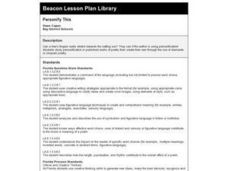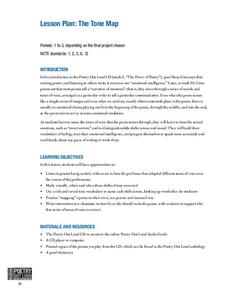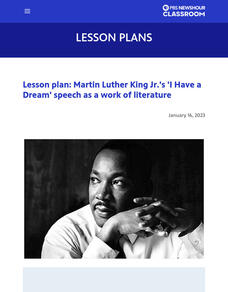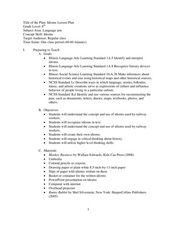Curated OER
Thomas Jefferson and the Declaration of Independence
Students examine readings and symbols to learn about the War of Independence and Thomas Jefferson. For this War of Independence lesson, students explore the role of Thomas Jefferson in the Declaration for Independence. Students answer...
Curated OER
A Tongue-Twisting Language Arts Lesson
Students discover enunciation and alliteration by reading tongue twisters in class. In this language arts lesson, students listen and repeat some of the classic childhood tongue twisters along with their teacher. Students...
Curated OER
Expressing Your Views to the Letter
Analyze the motivation, purpose, and value of letters to the editor by examining letters written in response to the violence at Columbine High School. For homework, middle and high schoolers write their own letters to the editor about an...
Curated OER
Revive, Contemplate, Integrate
Students recognize flags as a symbol through writing and imagery. For this artifact lesson, students investigate Tibetan prayer flags and their significance. Students create personal prayer flags and write about their life experience of...
Curated OER
Book Club Discussion: Things Fall Apart
Students read and discuss Chinua Achebe's novel Things Fall Apart. Students are guided to analyze the text through consideration of the author's use of 6 literary devices. Students also evaluate the text according to their personal...
Curated OER
Twelfth Night: Act 1, Scene 4
Students journal in response to reading act 1, scene 4 of Shakespeare's The Twelfth Night. In this literature lesson, students read the play, discuss characterization and other literary elements, and create a list of persuasive...
Curated OER
The Cask of Amontillado
Students examine the Edgar Allan Poe story "The Cask of Amontillado." In this character lesson, students discuss and analyze the characters in the story. Students make personal connections to the characters and create a brochure...
Curated OER
Metaphorical Poetry
Twelfth graders read and discuss poems by Jewel., Sylvia Plath, and Langston Hughes They examine poems for examples of metaphors and similes. After discussing Jewel's poem Lost, they write their own poems. They hold a poetry reading in...
Curated OER
Personify This
Eighth graders study personification in published works of poetry, then create their own through the use of diamante or cinquain poetry. They read and discuss poetry by Shel Silverstein, William Jay Smith, and Elinor Wylie.
Curated OER
The Tone Map
Students listen carefully to a portion of the Poetry Out Loud CD. They focus on the tones the poet uses in his recitation of a poem. Then they map a poem of their own so that a classmate can read it using the tonal qualities intended...
Curated OER
Onomatopoeia
Students identify onomatopoeia by identifying sound words in a book and drawing the animals that make those sounds. In this onomatopoeia lesson plan, students read the words as if they were the animal indicated.
Curated OER
Exaggeration
Students read the tall tale of Pecos Bill and identify an exaggeration in the story which they state as being part of a tall tale. In this exaggeration lesson plan, students identify the exaggeration by drawing a picture.
Curated OER
Metaphors
Students identify metaphors. In this figurative language lesson, students learn about metaphors and listen to various examples. Students read a story and identify the metaphors present. Students complete a worksheet...
Curated OER
Figurative Language
What is figurative language, and why do we use it? Introduce your high schoolers to some examples and discuss the importance of including this element in your writing. After studying a text and searching for examples, writers will...
PBS
Dr. Martin Luther King Jr.’s ‘I Have a Dream’ Speech as a Work of Literature
To appreciate the oratory of Dr. Martin Luther King Jr.'s "I Have a Dream" speech, scholars examine the rhetorical devices and influences that make the speech so famous. They examine background information, conduct a close reading of the...
Literacy Design Collaborative
Elie Wiesel's Acceptance Speech Analysis
Elie Wiesel's Nobel Prize Acceptance speech provides young historians with an opportunity to demonstrate their ability to use evidence from the speech. They work together to analyze how Wiesel uses rhetorical devices and syntax to...
EngageNY
Grade 10 ELA Module 2: Unit 2, Lesson 6
How do authors use rhetorical devices and word choice to emphasize their ideas? Pupils consider the question while reading paragraphs 16–19 from Julia Alvarez's essay "A Genetics of Justice." Readers engage in evidence-based discussion...
National Endowment for the Humanities
Shakespeare's Julius Caesar: Leadership and a Global Stage
Shakespeare's Julius Caesar is, among other things, the study of a ruler's ambitions. Young scholars watch videos, read articles, and keep a Commonplace Book while studying the play. At the end of Act III, pupils stage the play that...
California Department of Education
Call the Tune: Music in Literature
I am dancing to the music in my head. Scholars learn to listen for music in their heads as they read literature and poems. After they identify and analyze poetic devices that relate to music, they create their own musical poems.
Curated OER
Things Aren't Always What They Seem
Students use video and the Internet to make predictions, draw conclusions, determine conflict and point of view while reading a short story. In this short story analysis lesson, students watch a related video and complete a prediction...
Curated OER
Reading Plays
Students examine the role of tone in a comedy play. They also discover how to paraphrase a passage and explain a character's point of view.
Curated OER
CROSSWORD PUZZLE
Learners define from a word list for a literary selection. Using the literary selection, they read the vocabulary in context. They determine the definition of the word as used in context and create a crossword puzzle using the...
Curated OER
Crafting Poetry: A Sensory Journey
Tenth graders experiment with poetry devices to write poems. In this poetry lesson, 10th graders participate in learning stations. Students create a word pool and select a word from the list to create a line of poetry. Students complete...
Curated OER
Idioms Lesson Plan
Sixth graders discover idioms. In this idioms lesson, 6th graders evaluate idioms and discover their meaning. Students read Runny Babbit by Shel Silverstein and create unique idioms. Assessment rubric is provided.























